As a business owner in the UK estate agency industry, I am now contemplating what a Labour government in the UK may impact in terms of my role as an employer.
The following appear to be the key tenets to Labour’s plans, many of which seem, prima facie, to be introducing greater degrees of fairness but some of which might accelerate changes within the industry to avoid the undoubted additional operational burdens and costs on employers in complying.
As a general overview, the direction of travel ifs towards greater job security of employees, more flexible working practices, greater “health and family” benefits and more power to unions (no surprise there as they are amongst Labour’s main paymasters).
We shall, of course, see how plans roll out and turn into law but, given over forty pieces of planned legislation outlined in the King’s Speech, we can certainly expect more red tape rather than less and a possible move towards more central Government involvement.
It is interesting to see that they plan to carry out an AI impact assessment with a specific look at its effect on jobs and skills.
As I discussed in my last article, there is no doubt that AI will impact greatly on all of our lives. In the estate agency sector it will likely replace many roles that have seen the “added value” of human engagement being eroded. The speed and depth of these changes will be largely down to how the industry demonstrates that “added value”
The industry has already seen commodotisation coming more and more to the fore with low cost, semi DIY models taking increasing slices of market share, albeit without really winning the hearts and minds of many who experience the service being provided!
I predict an industry with many less people within it but where well harnessed IT, including AI based systems, takes on more of the work and where productivity which, for so long, has been in decline, turns a corner and increases.
These changes will also see more and more agents operating on a self employed brokerage model as they do in many other countries and territories worldwide.
The really interesting aspect will be around fees. Will the race to the bottom continue with consumers making decisions based on price or will the industry be able to re-establish itself as a high value, high fee operating model?
If Labour do introduce, as expected, mandatory qualifications and licensing of those in the sector then it will have to be the latter if it is to survive but I am yet to be convinced and look at the history of financial advisers and conveyancers as a potential clue as to what might happen.
With rafts of other employment legislation in the offing , as outlined below, we are, in my opinion, approaching a watershed moment. Thank goodness, I will be retired before it all falls into place!
Employment Rights and Status:
Unfair Dismissal Protection: Employees would have unfair dismissal protection from day one.
Reforms to Fire and Re-Hire Practices: Labour aims to address controversial fire-and-rehire practices.
Enhanced Redundancy Rights: Employees would receive stronger redundancy rights.
Single Status of Worker: Labour plans to create a single status of “worker” for all but the genuinely self-employed, ensuring consistent rights.
Strengthened Rights for the Self-Employed: Self-employed individuals would benefit from enhanced protections.
Workplace Protections and Equality:
Collective Grievance Mechanisms: Labour proposes collective grievance mechanisms.
Improved Employment Tribunals: Digitised and improved employment tribunals would enhance access to justice.
Fair Work Agency: A single enforcement body would oversee workplace standards.
Measures Against Sexual Harassment: Labour aims to strengthen protections against sexual harassment.
Ethnicity and Disability Pay Gap Reporting: Mandatory publication of pay gaps.
Menopause Action Plans: Large employers would implement menopause action plans.
Enhanced Leave Protections: Improved rights for terminal illness, pregnancy, carers, and bereavement leave.
Family-Friendly and Flexible Working:
Default Flexible Working: Flexible working would be the default from day one.
Expanded Parental Leave: Parental leave could be reviewed and potentially expanded.
Carers and Bereavement Leave: Statutory rights for carers and bereavement leave.
Health, Safety, and Fair Pay:
Modernised Health and Safety Regulations: Labour would update health and safety rules.
Genuine Living Wage: A living wage aligned with the cost of living.
Day-One Statutory Sick Pay: Sick pay from day one of illness.
Full Tips for Hospitality Workers: Strengthened laws to ensure full tips for hospitality staff.
Technology and Workers’ Rights:
AI Impact Assessment: Examination of AI’s impact on jobs and skills.
Right to Switch Off: Regulations on workplace surveillance.
Trade Unions and Collective Bargaining:
Repeal Restrictive Union Laws: Labour plans to repeal restrictive union laws.
Simplified Union Recognition Process: Easier recognition process for unions.
Access to Workplaces: Rights for unions to access workplaces.
Protections for Union Representatives: Strengthened protections for union reps.
Additional Reforms:
Enhanced TUPE Protections: Improved protections during business transfers.
Whistleblower Protections: Strengthened safeguards.
Ban on Exploitative Zero-Hour Contracts: Predictable hours based on a 12-week reference period.




